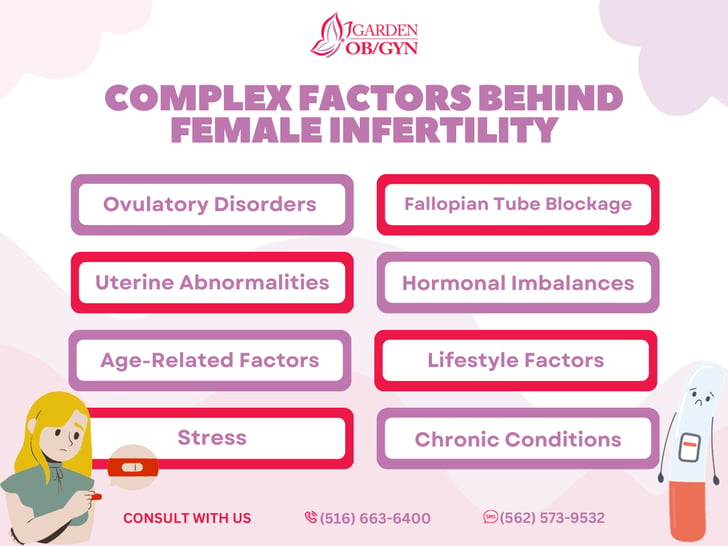Complex Factors Behind Female Infertility
Infertility, a global issue, can cause emotional stress. This article explores factors contributing to female infertility in couples facing this challenge.

Infertility is a common and distressing issue for many couples worldwide. When a couple struggles to conceive despite regular, unprotected intercourse for an extended period, it can lead to emotional and psychological stress. Infertility affects both men and women, but this article focuses on the factors that contribute to female infertility.
Understanding Female Infertility
Female infertility is a multifaceted issue with a range of potential causes. It's essential to recognize that infertility is not a character flaw or a personal failing but rather a medical condition with various underlying factors. Let's delve into some of the primary causes of female infertility:
- Ovulatory Disorders:
One of the most common causes of female infertility is ovulatory disorders. These conditions disrupt the regular release of eggs from the ovaries. Polycystic Ovary Syndrome (PCOS), a hormonal imbalance that affects ovulation, is a leading cause of ovulatory disorders. Other factors, such as stress, excessive exercise, or significant weight fluctuations, can also impact regular ovulation.
- Fallopian Tube Blockage:
The fallopian tubes play a crucial role in transporting eggs from the ovaries to the uterus. Any blockage or damage to these tubes can hinder the egg's journey, preventing fertilization. Pelvic inflammatory disease, endometriosis, and previous surgeries are common culprits that can lead to fallopian tube issues.
- Uterine Abnormalities:
Anomalies in the uterus can make it difficult for a fertilized egg to implant and develop properly. Conditions like fibroids (noncancerous growths in the uterine wall) and uterine polyps can interfere with conception.
- Hormonal Imbalances:
Hormones are essential for the regulation of the menstrual cycle and ovulation. Imbalances in hormones, including thyroid disorders or hyperprolactinemia (elevated levels of the hormone prolactin), can disrupt the delicate hormonal balance required for fertility.
- Age-Related Factors:
As women age, their fertility naturally declines. A woman's egg quantity and quality decrease over time, making it more challenging to conceive, especially after the age of 35. This age-related decline in fertility is often attributed to diminished ovarian reserve.
- Lifestyle Factors:
Certain lifestyle factors can contribute to female infertility. Smoking, excessive alcohol consumption, drug use, and obesity can negatively impact fertility. Maintaining a healthy lifestyle with a balanced diet and regular exercise can significantly improve a woman's chances of conceiving.
- Stress:
Stress can affect a woman's menstrual cycle and ovulation. While stress alone may not be the sole cause of infertility, it can exacerbate existing issues. Managing stress through relaxation techniques, counseling, or mindfulness can be beneficial.
- Chronic Conditions:
Chronic medical conditions such as diabetes, autoimmune diseases, and some cancers may affect a woman's fertility. Proper management of these conditions is essential for maintaining reproductive health.
Treatment Options
The treatment of female infertility depends on the underlying cause. Common treatments include:
-
Fertility medications to stimulate ovulation in cases of ovulatory disorders.
-
Surgery to correct anatomical issues, such as blocked fallopian tubes or uterine abnormalities.
-
In vitro fertilization (IVF) for couples with severe infertility issues.
-
Lifestyle changes, including weight management and stress reduction.
-
Assisted reproductive technologies (ART) for more complex cases.
Female infertility is a challenging and emotionally taxing condition that affects many women and couples. It is important to remember that there are numerous factors contributing to infertility, and it is a medical condition that can often be treated or managed with the help of medical professionals. Seeking timely medical advice, maintaining a healthy lifestyle, and exploring available treatment options are essential steps for individuals and couples on their journey to parenthood. By understanding the complex causes of female infertility, we can work towards providing support and solutions for those facing this challenging issue.
































